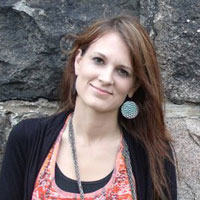
My first word was “no.”
My first sentence was “I amn’t gonna do it.”
I once cut all the kids in line at the mall just to tell Santa I didn’t believe he was real.
(He needed to know so he could get on with making a respectable living.)
Some people might say all this nay-saying makes me a born doubter. But I think, all things considered, it made me a born believer.
Because for me, even in childhood, doubt quickly became the best indicator that I actually gave a crap. If someone passed on a spiritual insight to me and I swallowed it immediately, there was a good chance:
A. I didn’t think it was important
But if I bothered mulling a new idea over, rolling it around in my mind and sifting it with suspicion?
I was engaged.
I was invested.
And the fact that I gave energy to examining it in the first place meant I sensed something important was at stake.
For me, then, doubt became the hook, the lure of understanding the unseen, that reeled me into faith.
Because of this, I tend to see doubt and faith as equal partners in a God-intended spiritual process.
After all, if the spiritual world wasn’t big and deep and transformative enough to challenge the literal world, there would be no reason to refer to it as “faith.”
Without stuff so epic it stirs doubt, there’s nothing to have faith in.
Without doubt to push through, it’s just facts and knowledge.
And if that were God’s intention, I suspect he would’ve handed us an encyclopedia instead of Jesus.
Instead, I think of faith and doubt as both being part of a natural system of the soul.
Our soul takes in a lot of information, a lot of which people claim are spiritual insights.
That Jesus is Lord.
That he rose from the dead.
That females who cut their hair are going to hell.
That cult followers should let their under-age daughters sleep with the community “prophet.”
Adopting a spirit of belief toward anything and everything people tell you is of God, of course, is not necessarily a sign of faith. Sometimes, as with a couple of the examples above, it’s a sign of confusion.
So you have to expel some things. Faith has to be nurtured by right beliefs, but the soul functions best when we discard unhealthy ideas.
In light of this, I’ve come to picture doubt as the process that helps us push dysfunctional information out of our souls.
If you only believe in faith, and never doubt anything, it makes no sense. You’d be like a person who just eats whatever they come across, with no regard for whether the amount or content could make them sick. No one who eats everything stays healthy.
In the same way, if you always choose a posture of doubt, this too gets ridiculous.
You become like the person who doesn’t believe in the value of any type of food and thus starves to death.
A healthy faith, then, continues to seek, to take in new and deeper insights to fuel growth, but it never stops doubt from doing the needed sifting.
————-
Thank you, Sarah. Keep up with Sarah on Twitter, on Facebook, or via her blog. And if you haven’t read her book Picking Dandelions, you should. Right now.
Previous posts in the “Voices of Doubt” series…
• Shawn Smucker: Doubt as Discovery
• Jamie Wright: A Born Doubter
• Trudy Morgan-Cole: The Squirmin’ Herman of Doubt
• David Sessions: The Hard Work of Faith
• Dean Nelson: Test Everything
• Carlene Bauer: Prodigal Daughter
• Larry Shallenberger: The Knight and the Fortune Cookie
• David Dark on Sacred Questioning
• Cara Davis: A Textbook Case
• Matthew Paul Turner: Letting Them See My Doubt
• Sally Lloyd-Jones: Where Did You Put Your Faith?
• Chad Gibbs: When It Doesn’t Seem Fair
• Leeana Tankersley: The Swirling Waters
• Robert Cargill: The Skeptic in the Sanctuary
• Dana Ellis: Haunted by Questions
• Rachel Held Evans on Works-Based Salvation
• Winn Collier: Doubt Better
• Tyler Clark on Losing Fear, Losing Faith
• Rob Stennett on the Genesis of Doubt
• Adam Ellis on Hoping That It’s True
• Nicole Wick on Breaking Up with God
• Anna Broadway on Doubt and Marriage
